Search
Search
First in the Nation: A History of the Costo Library
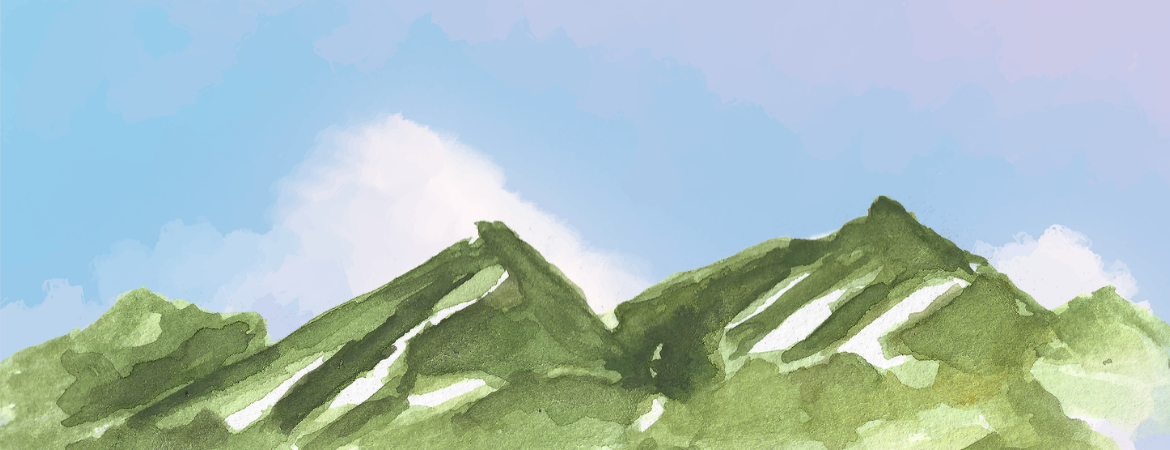
The Rupert Costo Library of the American Indian is a testament to the advocacy, expertise and legacy of its founders.
Rupert Costo (Cahuilla) and his wife Jeannette Henry-Costo (Eastern Cherokee) have supported UCR since its founding, even helping advocate for a UC campus to be built in Riverside in the first place. They believed in the power of education, and fought for Native American students to have equal access to education throughout their lives. In addition to helping bring a UC campus to Riverside, the Costos co-founded the American Indian Historical Society in San Francisco, and helped organize the First Convocation of the American Indian Scholars, a pivotal moment in the development of the field of Native American Studies. Throughout their lives, the Costos have been on the forefront of expanding access and representation of Native peoples in higher education. This legacy is deeply embodied in all three aspects of the endowment they gifted to UCR: their personal book collection, which forms the Costo Library of the American Indian, as well as their archives and their vision for the Costo Chair in American Indian History (now Affairs).
This exhibit documents the history of the Rupert Costo Library of the American Indian, located on the 4th floor of the Tomás Rivera Library in Special Collections & University Archives. View this exhibit and learn more about the Costos, the American Indian Historical Society, and why the Costos chose UCR to house their materials.
| Event | First in the Nation: A History of the Costo Library |
| Location | Tomás Rivera Library, 4th floor, Costo Library in Special Collections & University Archives (enter the double glass doors) |
| Dates | Monday, September 23, 2024 - Friday, June 6, 2025 |
| Hours | View this exhibit during SCUA's operating hours. Monday - Friday: 10 a.m. - 4 p.m. NOTE: We are closed during UCR observed holidays. |
| Parking | Free Visitor Parking is available on Fridays, starting at 12:00 PM through 6:00 AM Monday morning in the unreserved spaces of the following parking lots/structures:
|
New resources from Gale and AM
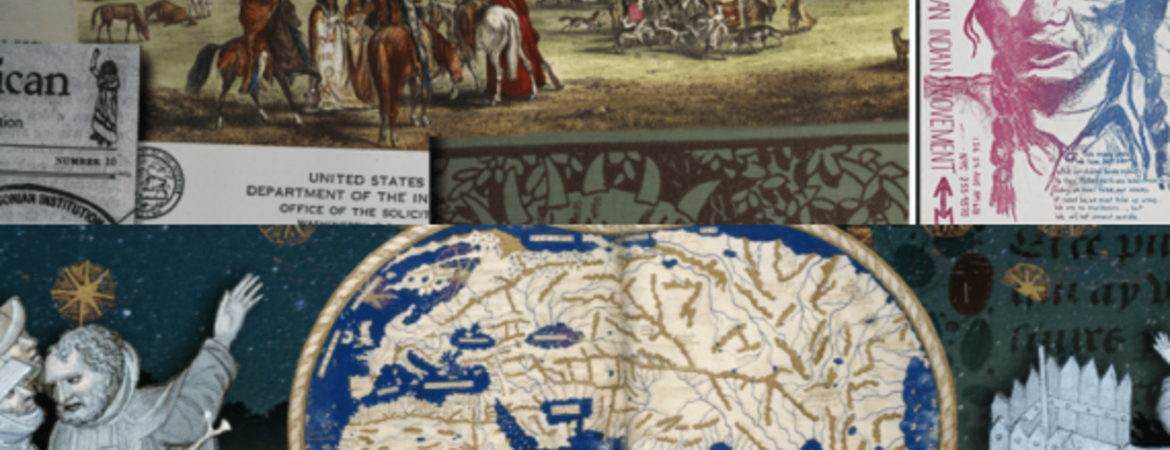
The UCR Library acquired access to several primary source archives from Gale and AM, formerly known as Adam Matthew Digital.
New resources from Gale:
-
Slavery and Anti-Slavery: A Transnational Archive
Slavery and Anti-Slavery: A Transnational Archive is devoted to the study and understanding of the history of slavery in America and the rest of the world from the 17th century to the late 19th century. The archive consists of more than five million cross-searchable pages sourced from books, pamphlets, newspapers, periodicals, legal documents, court records, monographs, manuscripts, and maps from many different countries covering the history of the slave trade.
-
Native American Studies from Archives Unbound
Collection of primary sources and more sourced from the following archives:
-
Presbyterian Historical Society Collection of Missionaries' Letters, 1833-1893
-
American Indian Movement and Native American Radicalism
-
Meriam Report on Indian Administration and the Survey of Conditions of the Indians in the U.S.
-
The Indian Trade in the Southeastern Spanish Borderlands: Papers of Panton, Leslie and Company
-
The War Department and Indian Affairs, 1800-1824
-
-
Indigenous Peoples of North America, Part 2
Primary source collection for research into the cultural, political, and social history of Native Peoples from the seventeenth to the twentieth century. The UCR Library has access to parts 1 & 2.
New resources from AM:
-
Colonial Caribbean: Colonial Office Files from The National Archives, UK
Stretching from Jamaica and the Bahamas to Trinidad and Tobago, Colonial Caribbean makes available materials from 27 Colonial Office file classes from The National Archives, UK. Covering the history of the various territories under British colonial governance from 1624 to 1870, this extensive resource includes administrative documentation, trade and shipping records, minutes of council meetings, and details of plantation life, colonial settlement, imperial rivalries across the region, and the growing concern of absentee landlords.
-
Confidential Print: Latin America
This collection consists of the Confidential Print for Central and South America and the French- and Spanish-speaking Caribbean. Topics covered include slavery and the slave trade, immigration, relations with indigenous peoples, wars and territorial disputes, the fall of the Brazilian monarchy, British business and financial interests, industrial development, the building of the Panama Canal, and the rise to power of populist rulers such as Perón in Argentina and Vargas in Brazil.
-
Empire Studies from AM Scholar
This collection offers a rich array of primary and secondary sources for the study of the British Empire. It features material on British colonial policy and government; perspectives on life in British colonies; the relationship between gender and empire; race; and class.
-
Literary Print Culture: The Stationers' Company Archive
The Stationers’ Company Archive is one of the most important resources for understanding the workings of the early book trade, the printing and publishing community, and the establishment of legal requirements for copyright provisions and the history of bookbinding. Explore extremely rare documents dating from 1554 to the 21st century in this resource of research material for historians and literary scholars.
-
Medieval and Early Modern Studies from AM Scholar
This collection provides a wide range of primary sources covering social, cultural, political, scientific, and religious perspectives from the 12th to early18th centuries. Document types include illuminated manuscripts, personal papers, diaries and letters, rare books, receipt books, and manuscript sheet music. The breadth of sources provided within this collection is extraordinary, from sources concerning the Black Death to the Restoration of the English monarchy and the Glorious Revolution.
-
Medieval Family Life: The Paston, Cely, Plumpton, Stonor and Armburgh Papers
Includes five major letter collections and associated manuscripts from fifteenth-century England, which take the user into the world of medieval families, businesses, relationships, trade, politics and communities. Medieval Family Life presents full-color images of the original medieval manuscripts of which these letter collections are constituted, alongside fully searchable transcriptions drawn from available printed editions.
-
Medieval Travel Writing is an extensive collection of manuscript materials for the study of medieval travel writing in fact and in fantasy. The core of the material is a collection of medieval manuscripts from libraries around the world, dating from the thirteenth to the sixteenth centuries and focusing on accounts of journeys to the Holy Land, India and China. Texts include some of the most influential prose works of the late Middle Ages – notably the books of Marco Polo and ‘Sir John Mandeville’ – but also important items by lesser-known authors such as John of Plano Carpini and Odoric of Pordenone.
-
Nineteenth Century Literary Society: The John Murray Publishing Archive
Nineteenth Century Literary Society makes available more than 1,400 items from the archive of the historic John Murray publishing company. Primary source materials span the entirety of the long nineteenth century and document the golden era of the House of Murray from its inception in 1768. Records digitized in this resource predominantly focus on the tenure of John Murray II and his son, John Murray III, as they rose to prominence in the publishing trade, launching long-running series including the political periodical Quarterly Review, and publishing genre-defining titles such as Darwin’s On the Origin of Species, Austen’s Emma and Livingstone’s Missionary Travels and Researches in South Africa.
-
Sourced from the records of the Race Relations Department of the United Church Board for Homeland Ministries, housed at the Amistad Research Center in New Orleans, this resource provides access to a wealth of documents highlighting different responses to the challenges of overcoming prejudice, segregation and racial tensions. These range from survey material, including interviews and statistics, to educational pamphlets, administrative correspondence, and photographs and speeches from the Annual Race Relations Institutes.
Former Chancellor Orbach visits his namesake library
Chancellor Emeritus Raymond L. Orbach visited his namesake library on the morning of Friday, April 7.
Escorted by University Librarian Steve Mandeville-Gamble, Deputy University Librarian Ann Frenkel, and Associate University Librarian Alison Scott, Chancellor Emeritus Orbach was treated to a pre-launch tour of the Creat'R Lab.
While there, he met with Medical Library Programs Coordinator Tiffany Moxham and Engineering Librarian Kat Koziar to learn about exciting developments in their respective divisions of the UCR Library.
Orbach was inspired to learn that the library has grown into an interdisciplinary hub and matchmaker, where various departments and their leadership are working together to advance the university, students, faculty, and the Inland Empire.
He was equally pleased to learn of the role the library played in the development of UCR’s School of Medicine (SoM). Medical Librarian Tiffany Moxham described how she has been a key partner in shaping practitioner development and providing research support to clinicians, residents, and others in the SOM community.
Perhaps most exciting for Orbach was when he heard about the collaborations being built with campus and community partners, thereby reducing the silo effect common at many large institutions. Orbach shared that this was his ultimate dream for UCR, and was thrilled to see the growing entrepreneurial ecosystem on campus, including the Creat’R Lab and EPIC (Entrepreneurial Proof of Concept and Innovation Center,) – a collaboration between UCR and Riverside city and county.
Orbach also commented that when he was Chancellor, he wanted to reverse the flow of traffic in the region (i.e. make Riverside the center of economic growth). If recent campus collaborations are any indicator of progress, he might see his wish come true as industry begins to call Riverside home, and UCR a partner, all of which is thanks in part to the UCR Library and a rich legacy of campus leadership.
Melvyl switched to WorldCat Discovery
Melvyl’s long-awaited switch to WorldCat Discovery, the Online Computer Library Center’s (OCLC) newer discovery user interface, launched on Monday, June 17, 2019.
Melvyl is the discovery platform for the University of California libraries.
As the world's largest library catalog, WorldCat helps users find items in libraries close to them and makes the UCR Library’s resources more visible to people on the Web.
What does it mean to faculty, students and staff to make the switch?
Library users will see a new interface. WorldCat Discovery has made many improvements in the user experience, including:
- newer technology infrastructure, which supports ongoing expansion and increased operability with other services
- interface automatically adapts to user devices, including smartphones, notebooks, laptops and desktop computers, to give people the same experience regardless of device. A new search algorithm delivers more relevant search results than the previous interfaces
- Library staff can better support interlibrary loan, reference and collection development
Technically, what does it mean to make the switch?
Basically, it’s changing URLs. Users who have Melvyl URLs listed on a department or course website or course management system will need to update their links or bookmarks.
The updated link for UC Riverside users is: https://ucr.on.worldcat.org/discovery
How to switch to WorldCat Discovery
Change your bookmark or website linked URLs that point to WorldCat Local to point to WorldCat Discovery anytime before August 9, 2019.
In the meantime, try WorldCat Discovery and report any problems directly to CDL at melvylops@cdlib.org.
What happens to personal lists on WorldCat Local?
Although it is not possible for personal lists attached to WorldCat Local accounts to be automatically ported into WorldCat Discovery, users can easily import lists from either WorldCat Local (or WorldCat.org) accounts to their WorldCat Discovery accounts using OCLC’s instructions here.
Looking ahead
CDL will continue to publish updates in CDLInfo News: Melvyl. Feel free to email the CDL Melvyl Operations Team if you have any questions.
For the latest information, see the CDL WorldCat Discovery Beta website.
Orange Roots
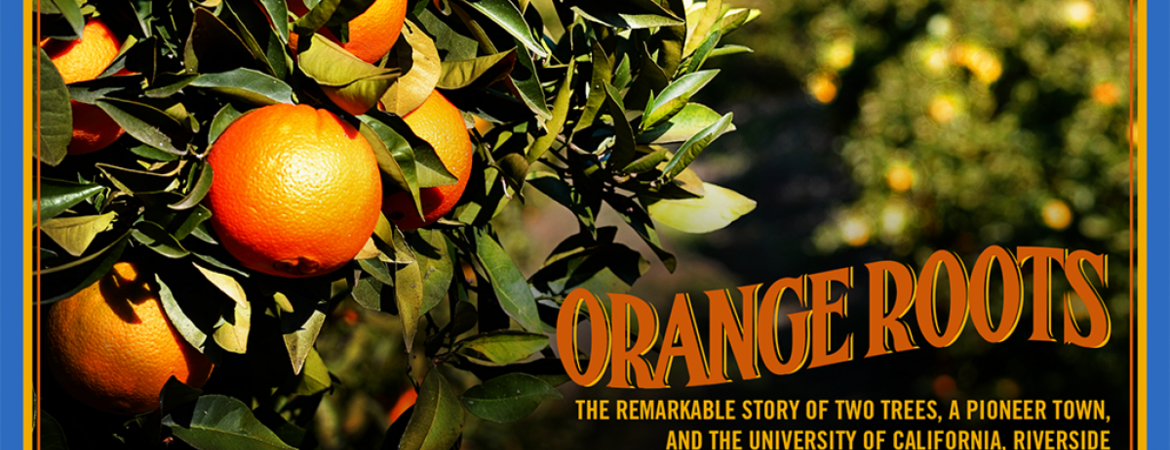
The University of California, Riverside Library invites you to celebrate the opening of a new exhibition, titled, “Orange Roots: The Remarkable Story of Two Trees, a Pioneer Town, and the University of California, Riverside.”
The welcome reception in honor of the exhibition’s opening will be held at the library, from 2-4 p.m. on Thursday, Nov. 10. The event is free and open to the public, but space is limited so we encourage you to register if you wish to attend.
The reception will include a talk by Susan Straight, professor of creative writing at UCR, and a citrus-tasting station where guests can sample different varieties of citrus fruits. The citrus-tasting station will be organized by Tracy Kahn, UCR’s Givaudan Citrus Variety Collection Endowed Chair. Free parking will be available. Those interested in attending should RSVP using the link below.
In honor of Homecoming and Discover Day, the University of California, Riverside Library invites you to join us for a curator-led tour of the "Orange Roots" exhibition. This tour will be held at Rivera Library from 12-1 p.m. on Saturday, Nov. 19, and led by exhibit curator and librarian Krista Ivy. The tour is free and open to the public, but space is limited so we encourage you to register if you wish to attend.
The exhibition will showcase the remarkable history of Riverside’s citrus heritage, from its early, pioneer days to the establishment of UCR. It will feature photographs, historical documents, and other memorabilia from the UCR Library Special Collections & University Archives, the UCR Citrus Variety Collection, the UCR Department of Botany and Plant Sciences, the Riverside Metropolitan Museum, and the Riverside Public Library.
The exhibition will remain on display at the Tomás Rivera Library through June 2017.
UCR Library Team Presents at NDLC 2016
Five UCR librarians presented at the National Diversity in Libraries Conference (NDLC) this August, including Judy Lee, Kent LaCombe, Stephanie Milner, Melissa Cardenas-Dow, and Julie Mason.
“Bridges of Inclusion” was the theme of the 2016 NDLC conference, which was presented by the Association of Research Libraries (ARL) and UCLA Library. UCR Library was also one of the conference sponsors, among other libraries and organizations.
NCLC 2016 highlighted issues related to diversity and inclusion that affect staff, users, and institutions in the library, archive, and museum (LAM) fields. UC Riverside's team of librarians presented throughout the 3-day event.
An emotional keynote address by Lakota Harden opened the conference. Speaking from the heart, she moved the audience to tears while sharing about her struggles as a Native American woman and her efforts to see that Native American histories and lives are portrayed honestly in literature.
Melissa Cardenas-Dow, UCR Research and Instructional Services Librarian and member of the ALA Task Force on Equity, Diversity, and Inclusion, presented in a panel session on the first day discussing lessons learned by the task force. On the second day, Melissa presented “Diversity Standards in Action: How Do We Practice & Value Cultural Competencies?” Melissa also played a role in planning the conference.
Judy Lee and Julie Mason served on a panel discussing successful Library and Information Science (LIS) Diversity Initiatives, exploring a new follow-up study on recruitment and retention with IE LEADS fellows.
Kent LaCombe and Stephanie Milner followed up with a poster presentation, exploring the impact of the IE LEADS program on institutional partners and affiliates. This project was led through the LAUC-R Diversity Committee. Patricia Smith-Hunt, Christina Cicchetti, and former UCR librarian Denise Kane are also part of the IE LEADS follow-up study research team.
The conference concluded with a lively discussion on “whiteness” and ARL Library Leadership between Director of Libraries at MIT and Chair of the ARL Committee on Diversity and Inclusion, Chris Bourg and April Hathcock, Scholarly Communications Librarian at NYU.
The next NDLC is slated for 2020.
New endowment established to fund queer literature collection
Last January, University Librarian Steven Mandeville-Gamble donated a full set of signed, first editions of the acclaimed Mark Manning novels by Michael Craft from his personal collection to the UCR Library’s Special Collections.
Upon so doing, he saw that the library needed an ongoing way to support the research and teaching efforts of UCR faculty such as Distinguished Professor George Haggerty and others who are exploring the LGBT experience in the United States.
In June 2018, he and the library’s Associate Director of Development Megan De Leon worked together to establish the Steven Lee Mandeville-Gamble Book Fund for Queer Literature.
“UCR was the first university in North America to establish an LGBT minor program," Mandeville-Gamble said. "The university has a rich history of the study of the LGBT experience through literature, the arts, social sciences, and beyond. By establishing this endowment, I am trying to do my small part to ensure that the university will have the resources to continue building a teaching and research collection that supports the faculty and students research, teaching, writing, and creating in this area.”
This endowed fund will support the UCR Library’s acquisition of literature and literary materials with gay, lesbian, bisexual, or queer-identified protagonists or major characters, or that fit within the larger genre of queer studies. It also leaves discretionary decisions for how to use the funds up to the collection strategists.
"University Librarian Steven Mandeville-Gamble has had tremendous foresight when setting up this fund," De Leon said. "This collection will support multiple faculty, is parallel with the research mission of the university, and provides flexibility for the library to acquire relevant materials. We are very lucky that this will be a collection on our campus."
To learn how you could support this endowment, please contact Jernine McBride.
Latino Americans Grant Team Kicks Off Year of Programming
Library launches program series surrounding Latino American experience
On October 9th, the UCR Library hosted a kickoff reception to launch a year of programming supported by the Latino Americans 500 Years of History grant. Awarded to the library earlier this year by the National Endowment of Humanities (NEH) and the American Library Association (ALA), the grant funds a series of programs focused on the Latino American experience. Events over the course of the next year will include documentary screenings and performances by project scholars.
Paul D’Anieri, Vice-Chancellor and Provost of Humanities and Social Sciences, and Steven Mandeville-Gamble, University Librarian discussed UCR’s role as a Hispanic Serving Institution and champion of diversity, and the library’s commitment to supporting that effort. Drs. Tiffany Lopez, Jonathan Ritter, and Jennifer Najera detailed their involvement in the year’s events, and program partner UCR Chicano Student Programs provided insight into the potential effect of these programs on their student populations. Community members in attendance shared stories about their lives and work in the community to promote continued and renewed interest in Latino Chicano American heritage and history.
The ALA and NEH designed the Latino Americans 500 Years of History grant to be inclusive of all members of the campus and local communities. Project partners such as the Center for Social Justice, Spanish Town Heritage Foundation, and several branches of Riverside Public Library will provide venues for some of the year's programs.
"We hope that this grant will foster a tradition of collaborative curriculum and promote further interest in the preservation of local community history," said grant Project Director Anthony Sanchez. The grant has received strong support from national student organizations such as MEXUS, as well as state and local public officials, many of whom attended the reception. The event provided a rare opportunity for cross-community conversations about upcoming projects and possible collaborations.
Finals Week Stress Relief: Spring 2023 Event Series
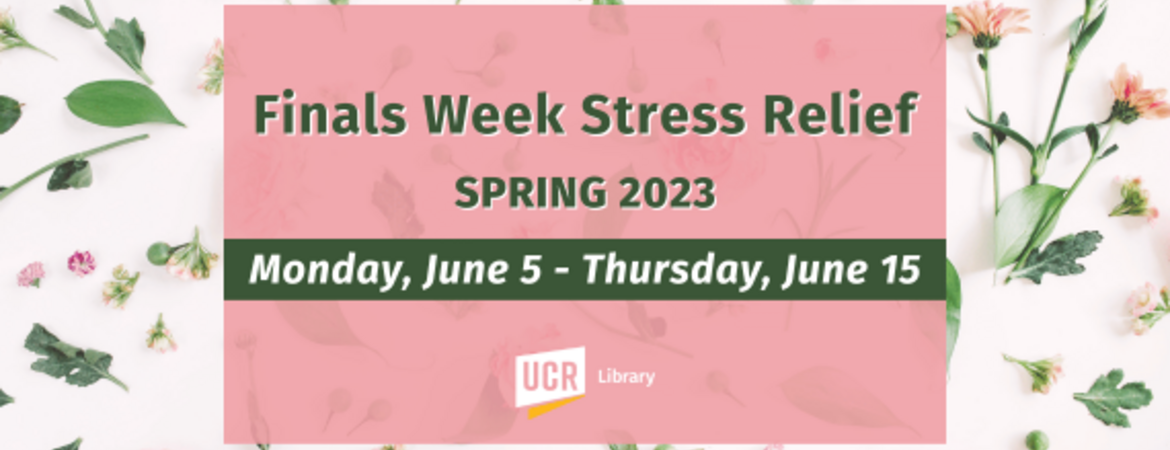
It's hard to believe that spring quarter 2023 is drawing to a close, but suddenly Finals Week is upon us!
The UCR Library is committed to creating a supportive atmosphere for our students, as final exams can breed a lot of stress. That is why we present our Finals Week Stress Relief (FWSR) event series at the end of every quarter. These events give library employees an opportunity to get to know our students better, and for our students to let off steam together in a safe and fun way.
Finals Week Stress Relief will kick off on Monday, June 5, 2023.
Along with our event schedule, you can also enjoy curated virtual stress relief activities, enter our social media contests, and help us improve Finals Week Stress Relief by taking our survey (entrants are entered into a drawing to win an Amazon gift card). More details about this quarter's FWSR below:
Event Schedule
Monday, June 5
- Surprise Snack Giveaway (Rivera & Orbach) | Time is a surprise | *While supplies last
Tuesday, June 6
- Bottled Bliss: Sand Art Event (Rivera) | 3 - 4 p.m. | *While supplies last
- Kahoot! (Virtual) | 2 - 3 p.m. & 6 - 7 p.m. | RSVP on Eventbrite to save your seat. Play via Zoom to win an Amazon gift card.
Wednesday, June 7
- Therapy Fluffies with The Well's Active Minds (Rivera & Orbach) | Noon - 2 p.m.
Thursday, June 8
- Float Through Finals with Root Beer Floats (Orbach) | 2 p.m. | *While supplies last
Friday, June 9
- Paint the Stress Away: Watercolor Wellness (Orbach) | 1 - 2 p.m. | *While supplies last
- Spin It to Win It (Rivera) | 2 - 3 p.m. | *Win prizes while supplies last
Monday, June 12
-
Grab a Cup of Esquites (Orbach) | 2 p.m. | *While supplies last
Tuesday, June 13
- Breakfast Burrito Giveaway with ASPB (Rivera) | 2 p.m. | *While supplies last
Wednesday, June 14
- In-Person Bingo (Orbach) | 2 - 3 p.m. | *Winners receive an Amazon gift card
Thursday, June 15
- Surprise Snack Giveaway (Rivera & Orbach) | Time is a surprise | *While supplies last
Virtual Stress Relief
You can also enjoy our curated and extensive list of free, online activities that we hope R'Students will enjoy. Visit library.ucr.edu/activities and click on each of the category tabs at the top of the page to see all the options.
Instagram Contests
In addition, there will be daily Instagram comment contests from Monday, June 5 - Friday, June 9. Comment on our contest posts for a chance to win an Amazon gift card. Make sure you are following instagram.com/ucrlibrary.
We Need Your Feedback
Help us improve Finals Week Stress Relief! Current UCR students can fill out our short survey here: forms.gle/zTvZQ2wDa182K2q28 (make sure you're logged into your R'Mail account so you can access the survey) from Monday, June 5 - Wednesday, June 14 for a chance to win one of five Amazon gift cards! Winners will be notified on Thursday, June 15.
Library Finals Week Hours
Study till 2 a.m. in Orbach Friday, June 9 - Thursday, June 15!
During Study Hall, Orbach Library will be open for studying, scanning, and printing, including the use of public computers. The borrowing of materials and equipment (reserves, books, calculators, and/or chargers) will NOT be available during Study Hall.
Friday, June 9
Service hours for Rivera & Orbach: 7:30 a.m. - 10 p.m.
Study Hall for Orbach Library: 10 p.m. to 2 a.m.
Saturday, June 10
Service hours for Rivera & Orbach: 8 a.m. - 10 p.m.
Study Hall for Orbach Library: 10 p.m. to 2 a.m.
Sunday, June 11
Service hours for Rivera & Orbach: 1 p.m. - 9 p.m.
Study Hall for Orbach Library: 9 p.m. to 2 a.m.
Monday, June 12 - Thursday, June 15
Service hours for Rivera & Orbach: 7:30 a.m. - 12 a.m.
Study Hall for Orbach Library: 12 a.m. to 2 a.m.
Friday, June 16
Hours for both libraries: 7:30 a.m. - 7 p.m.
UC Love Data Week 2025
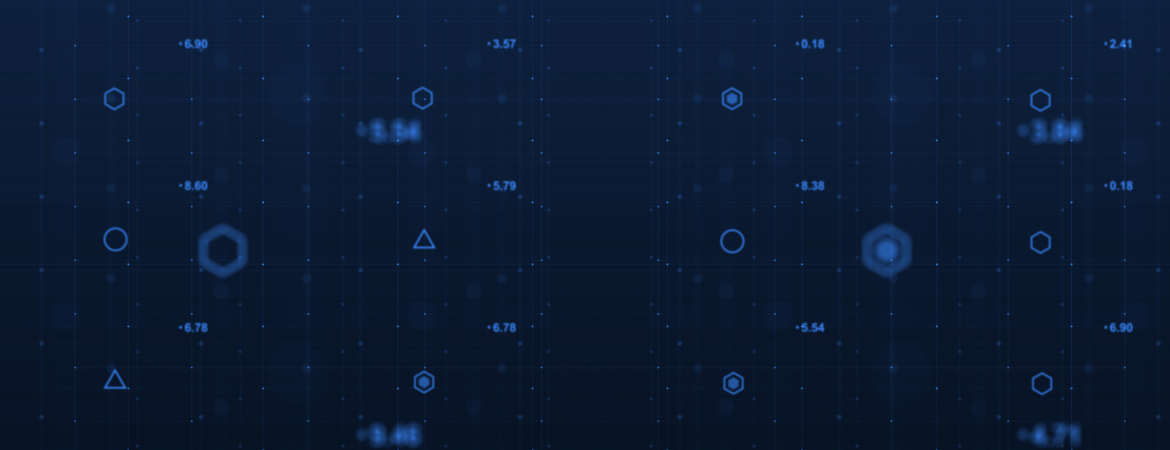
The UCR Library is excited to participate once again in UC Love Data Week, taking place February 10–14.
This virtual UC-wide event offers a range of workshops and presentations designed to help the UC community better understand and manage their data.
From data access and preservation to cutting-edge topics like artificial intelligence, UC Love Data Week provides valuable resources for researchers at all levels.
The UCR Library is proud to host two workshops as part of this year’s lineup. The first, Data Research Repositories, Digital Scholarly Ecosystems, Open Science & AI Possibilities, led by Acting AUL for Research and Technology Ray Uzwyshyn and Maker Services Coordinator Brendon Wheeler, will explore these topics to help illustrate relationships between data and artificial intelligence.
The second workshop we are hosting is To Be or Not to Be: Photogrammetry and Virtual Reality Environments, presented by Innovative Media Librarian Alvaro Alvarez and Brendon Wheeler. They will go over how to store 3D data and how to engage the data with virtual reality using Unity.
Participants can browse the full schedule of workshops and presentations and register at https://uc-love-data-week.github.io/. Make sure to register with your UC-campus email.
Library STEM Office Hours Data Week Event
Our Library STEM Team will be hosting drop-in office hours on February 12 to help you make sure your data is findable and reusable.
February 12 | 12-1:30 - Love Data Week Dryad-a-thon! | Orbach Library Room 122
Do you have questions about depositing your data and making sure it’s findable and reusable? Are you ready to upload your data into Dryad, the Open Source data repository supported by the UCR Library? Join us for this special LibSTEM Team Office Hour for International Love Data Week we will be featuring a Dryad-a-thon where we will be going through step-by-step instructions on how to upload your data into the Dryad Research Repository, which allows you to create a persistent DOI and citation for your dataset. Bring your questions and enthusiasm, we’re here to help you learn more about data repositories and how to use Dryad, ICPSR or other data repositories like a pro.